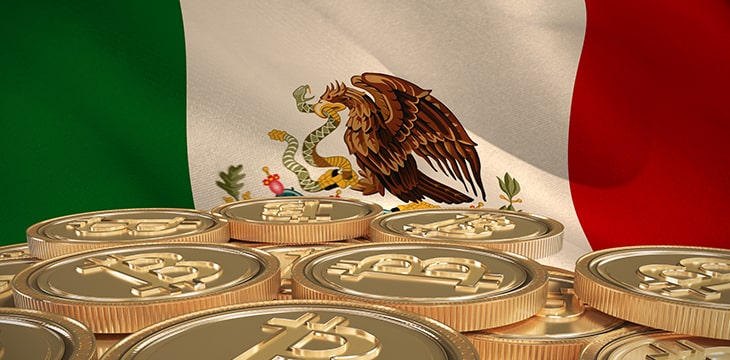It’s pretty clear to anyone who’s paying attention that BTC is running up against reality fast. After a brief celebratory period at the beginning of 2021, the narrative around BTC adoption as the next world reserve currency is starting to come undone.
Claims by Max Keiser and others that the world would see a wave of institutional adoption in Q2 and Q3 of 2021 have failed to live up to the hype. Other than a few renegades and rogues like MicroStrategy (NASDAQ: MSTR) and El Salvador, the reception to BTC has been lukewarm at best.
Things don’t look like they’re going to change anytime soon. After a humiliating rejection by Tesla (NASDAQ: TSLA) on the grounds of environmental concerns, the Mexican government has become the latest party to give BTC maximalists a much-needed reality check.
The Bank of Mexico and the Ministry of Finance have both issued statements warning that digital currencies, including BTC, aren’t legal tender. They made it clear that institutions were prohibited from accepting BTC and other virtual currencies after billionaire Ricardo Salinas Plíego announced that Banco Azteca was planning to accept it.
It seems that authorities in larger and more complex economies understand the limitations of BTC and the need to comply with both national and international financial regulations.
What happened? Who is Ricardo Salinas Plíego?
Ricardo Salinas Plíego is a billionaire businessman with interests in finance, telecommunications, retail, and media. He founded one of Mexico’s largest banks, Banco Azteca, and recently announced it was planning to accept BTC.
Perhaps trying to ride the wave of positive attention that El Salvador enjoyed when it adopted BTC as legal tender, or the stock price pump MicroStrategy initially enjoyed when Michael Saylor bet the farm on BTC, Plíego was stopped short when Mexico’s most powerful financial institutions warned that accepting BTC would leave involved parties open to sanctions.
The Mexican authorities stated that these measures were in place to “maintain a healthy distance between them (virtual assets) and the financial system.” Yikes!
This isn’t a surprise in a country riddled with corruption and drug cartel money and its associated problems like money laundering. It’s the first sign that, when entering the big leagues, BTC has all of the problems that Dr. Craig Wright and others associated with BSV enterprise blockchain have been pointing out for years.
As the reality of El Salvador’s plan to accept BTC sets in, including a rejection from the World Bank to help them integrate it, BTC is running up against the very problems those associated with it refuse to acknowledge or deal with, those mostly being legal and regulatory compliance. Issues related to actually using BTC as a form of currency will become apparent later.
How is El Salvador different?
So, why was El Salvador able to adopt BTC as legal tender while Mexico is not?
The answer lies in the law. Mexico’s authorities were keen to emphasize that BTC was not legal tender under the current laws, while El Salvador’s President Nayib Bukele took a different approach; he rammed through a law to make BTC legal tender with clauses that force merchants to accept it.
That’s hardly in the spirit of what BTC maximalists claim to be about, namely voluntaryism and free choice, but nonetheless, they loudly celebrated the passing of the new law along with the price action that followed.
However, it remains to be seen if El Salvador’s plan will ever come to pass in reality. Along with the World Bank’s rejection of any assistance in implementing the idea, there are serious questions that must be answered by any nation or entity wishing to use or adopt BTC. These range from whether or not nations will be able to pay their debts in BTC to how they will comply with the KYC/AML regulations woven into the world financial system, to how El Salvadorans will be able to use BTC given its sky-high on-chain fees and the legally precarious position of Strike, the current best hope for using Lightning to solve BTC’s scaling issues.
Will Mexico adopt BTC in the end?
It is possible that the current laws in Mexico could change to allow BTC to become legal tender. Billionaires like Ricardo Salinas Plíego no doubt have influence with lawmakers, but based on the initial reaction from the country’s most powerful financial bodies, it’s going to be a long road. Their immediate rejection of Plíego’s plan and the warning about sanctions imply that they aren’t even close to embracing the idea.
Whether they like it or not, BTC advocates will have to reckon with reality at some point; laws exist for a reason, and even if you think you have a decentralized, uncensorable system, nations and other powerful actors in the world financial system will enforce the existing rules at all costs.
Those involved with BSV enterprise blockchain have known this from day one and have built the system to comply with all existing laws and regulations. You have to wonder what else they might be proven right about in time.
Watch: CoinGeek Zurich panel, The History of Money & The Future of Bitcoin
Source: Read Full Article
